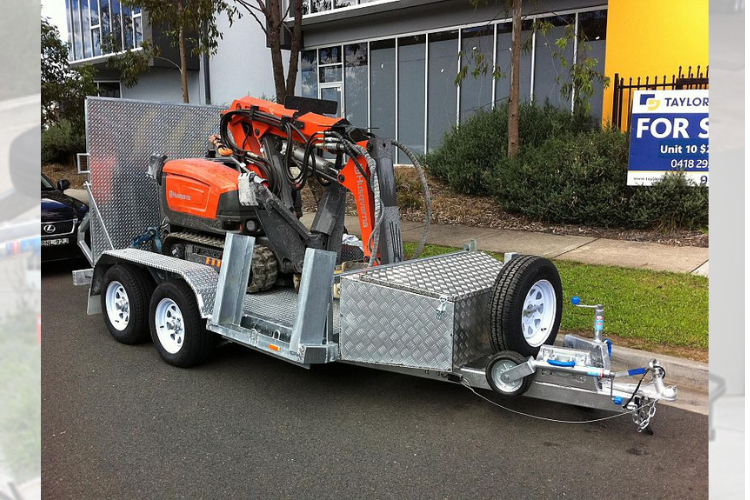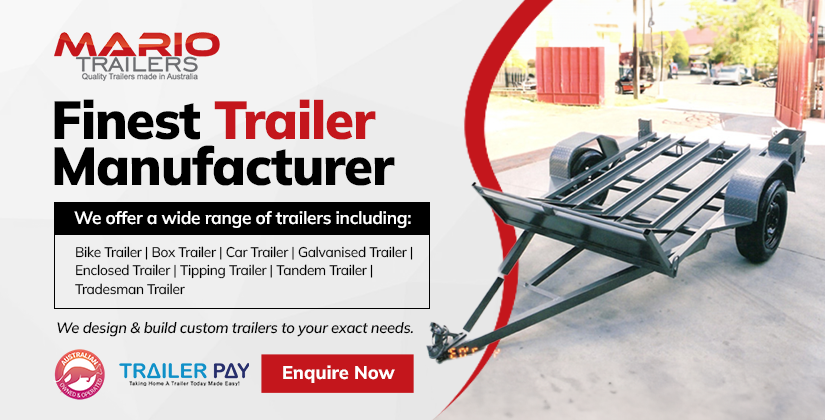
Designed to carry heavy equipment and machinery efficiently and safely, machinery trailers are vital for construction, agriculture, and manufacturing industries. Choosing the right trailer is essential for ensuring the safety of your machinery during transport and complying with local regulations.
When purchasing machinery trailers in Sydney, many buyers encounter challenges due to insufficient research or lack of knowledge about their specific needs. It can lead to costly consequences, including damage to expensive equipment, legal issues, and potential safety hazards on the road. By understanding common pitfalls and how to avoid them, you can make an informed decision when selecting the perfect trailer for your machinery transport needs.
1. Not Knowing the Right Trailer for Your Machine
Many buyers make the mistake of purchasing a trailer that does not adequately accommodate their machinery’s size or weight. It can lead to risky transportation and likely damage to the machinery and the trailer.
Therefore, understanding the available trailer types and matching them to your machinery requirements is imperative. For instance:
- Flatbed trailers are versatile options suitable for general equipment transport. These trailers provide a large, flat surface area, making them perfect for hauling diverse types of machinery.
- Low-loader trailers are designed to carry heavy or oversized machines with a lower centre of gravity, providing enhanced stability during transit.
When searching trailers for sale, consider consulting with experts who can guide you in selecting the most appropriate trailer type based on your machinery’s dimensions, weight, and specific transport needs.
2. Ignoring Weight Capacity
Weight capacity is the most critical factor to consider when purchasing machinery trailers. Overlooking this aspect can lead to severe consequences, including accidents, trailer damage, and legal issues.
Exceeding a trailer’s weight limit puts undue stress on its structure, tyres, and braking system. It compromises the safety of your machinery and poses a significant risk to other road users. Additionally, overloading a trailer can result in fines and penalties if caught by authorities.
Check the trailer’s load capacity and compare it to your machinery’s weight to ensure safe and legal transportation. When in doubt, opt for a trailer with a higher weight capacity to accommodate any potential increases in load or future machinery purchases.
3. Overlooking Local Regulations
Sydney has specific laws and regulations governing the use of machinery trailers on its roads. Failing to comply with these regulations can result in hefty fines, legal issues, and potential safety hazards.
To avoid these problems, familiarise yourself with transport regulations. This includes understanding weight limits for different road types, dimensional restrictions, and any required permits for oversized or overweight loads. Additionally, ensure that your trailer meets all safety standards and is equipped with the necessary features, such as proper lighting and braking systems.
When purchasing machinery trailers, work with reputable dealers who are well-versed in local regulations and can provide guidance on compliance issues.
4. Focusing Only on Price
While looking for cost-effective options is understandable when buying machinery trailers, focusing solely on the price can be a mistake in the long run. Opting for the cheapest trailer available might seem like a good deal initially, but it often leads to higher expenses over time due to poor quality and frequent repairs.
Instead of focusing on price alone, consider trailer’s overall value. Look for high-quality trailers for sale that offer durability, reliability, and longevity. A robust and sturdy trailer may have a higher initial cost but will save you money in the long run through reduced maintenance needs and a longer life.
When evaluating trailers, consider the material, build quality, warranty coverage, and the manufacturer’s reputation. Investing in a quality trailer will ensure machinery is transported safely and efficiently.
5. Not Considering Maintenance Needs
Maintenance is a crucial aspect of owning machinery trailers that many buyers overlook. Ignoring regular maintenance can witness unanticipated breakdowns, safety issues, and reduced trailer life.
When choosing a trailer, consider its maintenance requirements and the availability of parts and service providers. Opt for trailers with easily accessible components and straightforward maintenance procedures. This will make it easier to keep your trailer in top condition and minimise downtime.
Additionally, enquire about the availability of spare parts and the presence of authorised service centres. Easily reachable maintenance support can save you time and money in case of any problems with your trailer.
6. Skipping the Inspection and Test Drive
Purchasing a machinery trailer without a thorough inspection or test drive is a risky move that can lead to unexpected problems down the road. Hidden defects or issues may not be visible from a glance or product description alone.
Before finalising your purchase, always insist on a detailed trailer inspection. Inspect for indicators like wear, damage, or poor maintenance. Consider crucial components including, the chassis, suspension, brakes, and electrical systems.
If possible, take the trailer for a test drive with a load similar to what you will be transporting. This will give you a better idea of how the trailer handles, its stability, and any potential issues that may arise during actual use. For flatbed trailers, test how easily you can load and secure your machinery to ensure it meets your specific needs.
7. Forgetting Safety Features
When selecting machinery trailers, safety has to be the number one priority. Unfortunately, some buyers overlook crucial safety features in favour of other considerations.
Essential safety features for machinery trailers include robust braking systems, proper lighting, and adequate load restraints. The braking system should be appropriate for the trailer’s size and weight capacity, ensuring safe stopping distances even when fully loaded. Lighting is critical for visibility, especially during night-time transport or in adverse weather conditions.
Load restraints are important for flatbed trailers and other open designs. Ensure the trailer has sufficient tie-down points and comes with high-quality straps or chains for securing your machinery. Some trailers may also feature safety elements like anti-sway systems or advanced suspension designs for improved stability.
When searching for trailers, prioritise models that offer comprehensive safety features to protect your valuable machinery and ensure compliance with road safety regulations.
8. Not Planning for the Future
When purchasing machinery trailers, it is essential to consider your current needs, as well as, your potential future requirements. Failing to plan for future growth or changes in your machinery fleet can result in untimely trailer replacement.
Consider factors such as potential business expansion, acquisition of larger or heavier machinery, or diversification of your equipment. Opting for a slightly larger or more versatile trailer might save you from future upgrades.
For instance, if you currently require a flatbed trailer for your machinery transport needs but anticipate transporting taller or heavier equipment, consider investing in a low-loader trailer to accommodate a wider range of machinery. This forward-thinking approach can lead to significant cost savings and increased flexibility in the long run.
9. Choosing an Unreliable Dealer
The dealer ensures a satisfactory purchase experience and long-term support for your machinery trailer. Opting for an unknown or unreliable seller can lead to various issues, including poor-quality trailers, lack of after-sales support, and potential warranty issues.
When looking for trailers for sale, prioritise reputable dealers with a strong track record in the industry. Look for dealers who specialise in machinery trailers and have extensive knowledge about the products they sell. Check customer reviews and testimonials to evaluate the dealer’s reliability and customer service quality.
A trustworthy dealer will provide high-quality trailers and offer valuable advice on selecting the right trailer for your needs, assist with customisation options, and provide reliable after-sales support. They would be familiar with local Sydney regulations and can guide you through any compliance requirements.
Final Thoughts
Purchasing machinery trailers requires careful consideration of various factors to ensure you make the right choice for your needs. By avoiding common mistakes such as neglecting weight capacity, overlooking local regulations, focusing solely on price, and forgetting crucial safety features, you can select a trailer that will serve you well for years.
Remember to research your options, consult with experts, and choose a reputable dealer when looking for trailers for sale in Sydney. Whether you are in the market for a versatile flatbed trailer or a specialised low loader, taking the time to make an informed decision will result in a safer, more resourceful, and cost-efficient solution for transporting your treasured machinery.






